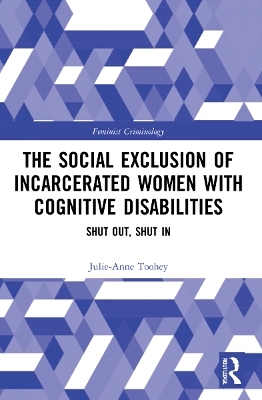
The Social Exclusion of Incarcerated Women with Cognitive Disabilities
Routledge (Verlag)
978-1-032-12576-3 (ISBN)
The Social Exclusion of Incarcerated Women with Cognitive Disabilities explores the lived experience of cognitively disabled women incarcerated in Australia. It draws upon in-depth interviews with Indigenous and non-Indigenous women, as well as interviews conducted with prison practitioners – psychologists, counsellors, and Aboriginal Liaison Officers.
Using a theoretical framework of social exclusion, the book charts the complex intersection between cognitively disabled women and the Criminal Justice System, and how this connection works to foster and maintain a state of social exclusion prior to incarceration, and equally, within the prison setting. The book also provides a practical template for other researchers to use when investigating the aligned fields of the Criminal Justice System and incarceration, women offenders, cognitive disability, and social exclusion. By placing the voices of the incarcerated women with cognitive disabilities ‘front and centre’, a new and innovative approach to social exclusion emerges. The book moves beyond the 'telling of sad stories' to examine the social and political climate that permits disadvantage, inequality, and injustice to flourish.
This book will be of great interest to academics and students in criminology, criminal justice, disability studies, women’s and gender studies, and penology. In exploring theory in a practical way, it will also be of use to those involved in the health sector, community services, disability support agencies, disability advocates, prisoner advocacy, women’s studies and women’s advocacy, and human rights activism.
Julie-Anne Toohey is a lecturer and researcher at the University of Adelaide, South Australia. Key areas of research include the importance of maintaining connections between incarcerated parents and their children, and the lived experiences of incarcerated women with cognitive disabilities. Her research has taken place in a number of prisons throughout Australia, and privileges the voices of incarcerated people. Julie-Anne has taught Criminology at the University of Tasmania, the University of South Australia, and Flinders University, and has been part of research teams associated with the Criminology Research Unit at the University of Tasmania and the Crime and Policy Research Unit at Flinders University. She completed her PhD in Criminology through the University of Adelaide.
Preface: The face of social exclusion
Ch.1: Introduction
Ch.2: Forecasting Social Exclusion: Cognitive disability and the Criminal Justice System
Ch.3: Social Exclusion in context: Determining causes, evaluating consequences
Ch.4: Pathways to prison, pathways to social exclusion
Ch.5: Off to prison – you know the way…
Ch. 6: Opposing paradigms: cognitive disability and women’s prisons
Ch.7: Revealing the face of social exclusion
| Erscheinungsdatum | 02.12.2021 |
|---|---|
| Reihe/Serie | Feminist Criminology |
| Zusatzinfo | 2 Tables, black and white; 15 Line drawings, black and white; 1 Halftones, black and white; 16 Illustrations, black and white |
| Verlagsort | London |
| Sprache | englisch |
| Maße | 156 x 234 mm |
| Gewicht | 453 g |
| Themenwelt | Geisteswissenschaften ► Psychologie ► Allgemeine Psychologie |
| Geisteswissenschaften ► Psychologie ► Sozialpsychologie | |
| Medizin / Pharmazie ► Medizinische Fachgebiete ► Psychiatrie / Psychotherapie | |
| Recht / Steuern ► Strafrecht ► Kriminologie | |
| Sozialwissenschaften ► Soziologie ► Gender Studies | |
| ISBN-10 | 1-032-12576-4 / 1032125764 |
| ISBN-13 | 978-1-032-12576-3 / 9781032125763 |
| Zustand | Neuware |
| Haben Sie eine Frage zum Produkt? |
aus dem Bereich


